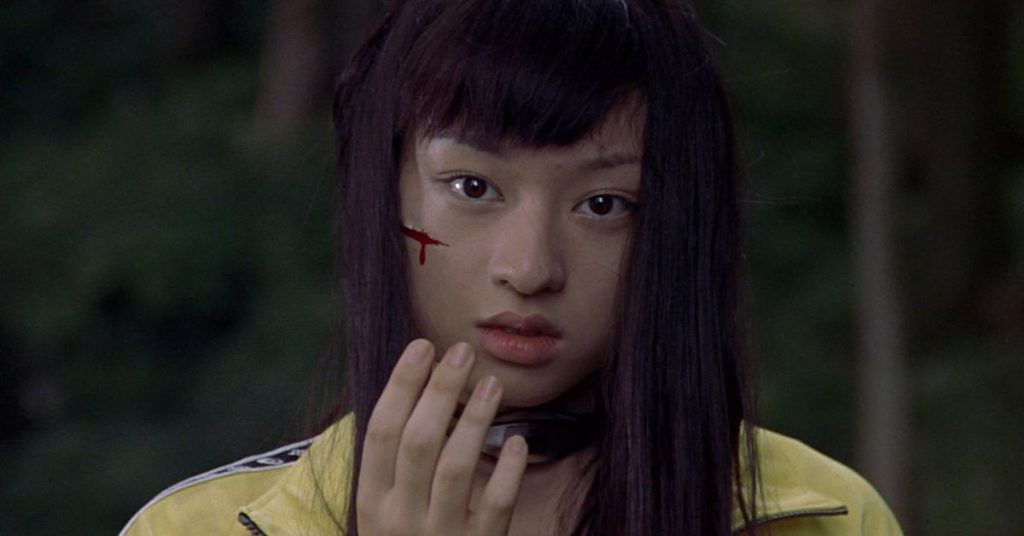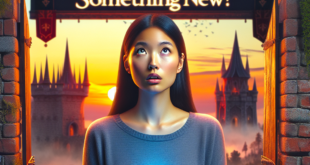
Before The Hunger Games, Fortnite, or Squid Game, the concept of the “battle royale” came from a pulpy 1999 Japanese novel by Koushun Takami. The movie, directed by Kinji Fukasaku and released just a year later, slims down some of the book’s context (scrubbed is the alternate history of Japan winning World War II), but the setup is more or less the same: a class of 15-year-old students are randomly selected to be made an example of. They are dropped on a remote island, given some weapons, and forced to kill each other off until a single person remains — the victor. Kids murdering each other? How cruel! But that’s the point. The violence of the battle royale is supposed to scare the authoritarian regime’s citizens into productive submission. As the students die, the movie counts down the remaining ones, like sport. Battle Royale is mean, and it’s not subtle.
(Some very light spoilers to follow.)
Like many great thrillers, it’s also fast, funny, and vicious. Battle Royale streams on the Criterion Channel today as part of a monthlong “High School Horror” series. This is a perfect excuse to revisit a work that holds up remarkably well 20 years later. It’s easy to see why the movie is a cult hit: Battle Royale is provocative, violent, and maybe more memorable for its influence on film than the quality of its actual filmmaking. (An endorsement from Quentin Tarantino didn’t hurt, either; he liked one of the actors, Chiaki Kuriyama, so much that he cast her as the meteor hammer-wielding mini-boss in Kill Bill Vol. 1.) It’s a good, deranged time and more committed to its conceit than the many things it later inspired.
Battle Royale is bloody — sometimes comically, other times brutally, with bright red sprays of corn syrup shooting across the screen. Meanwhile, the high school archetypes here are less along the lines of jock, goth, and nerd and more strongly imbued with adolescent motivation: the loyal romantics, the jealous frenemies, a handful of horny boys, the outsider who learns to be cutthroat (she literally cuts a throat). The construction is great, as each student reveals how willing they are to participate in order to survive.
The kids’ performances are not exactly memorable. Thankfully, Japanese legend Takeshi Kitano centers the movie as the class’s former teacher, now running the battle royale from a command center. Solemn, sarcastic, malicious, and, yet, soulful — Kitano is so good you’ll wish there was more of him in the movie. At the beginning, when the rules of the game are explained, one student asks if they can go home if they win. “Yes,” Kitano replies, “but only if everyone else is dead.”
Even with the barbarity, an earnestness exists in Battle Royale. It has all the trappings of YA before that was even a common marketing term for literature: raising the petty melodramatic stakes of high school, which sometimes feel like life or death, by making them actually life of death. Cliques form. Rivalries renew. Characters band together, believing teamwork can get them off the island in one piece. But it’s the selfish ones, who will do anything to survive, that make it the furthest. As one loner puts it, “Why not kill? Everyone has their issues.”
Rewatching Battle Royale in 2023, it’s easy to see the lines of influence. It’s also clear that none of the later iterations were quite as successful.
Suzanne Collins’ Hunger Games trilogy, both the books and films, eschewed Battle Royale’s loud satire of Japan’s stagflation anxiety and swapped it for a more universal political parable, expanding the scope of the tournament into full-on class warfare (though its dystopian setting is drawn so broadly that it’s hard to feel any specificity or connection to our world). Later, Fortnite took the elimination formula and turned it into a monstrous success, though it transformed Battle Royale’s notion of “children killing children” into a game for children: cartoon characters; brand-licensing deals with Disney, MrBeast, and Ariana Grande; and a silly, goreless competition that removes itself from its bloodsport origins. (There will always be something disturbing to me about shooting someone to death and dancing over their body, even in a video game.)
Squid Game, Netflix’s biggest Korean series, kept the Battle Royale stakes but, instead of putting its contestants on a battlefield, ran them through a series of silly, non sequitur games — deathmatch by way of Mario Party. Unlike the grim, sometimes drab look of Fukasaku’s movie, Squid Game is lavish with neon colors and rich iconography. It’s no wonder it became a cultural touchpoint and the stuff of memes. The series’ late reveal feels underdeveloped (rich people… bad!), but in some ways, Squid Game carries out the promise of Battle Royale even more faithfully than the original or anything that came after it by giving us the tragic ending of a lone winner.
Criterion is streaming the director’s cut of Battle Royale, which adds an extra eight minutes. It hardly feels like enough. Maybe that’s the one thing that this movie has over the three Hunger Games books (and four movies), endless live service updates of Fortnite, and the many seasons of Squid Game that are no doubt in development. For all the carnage, Battle Royale will leave you wanting more.

 Latest Breaking News Online News Portal
Latest Breaking News Online News Portal




